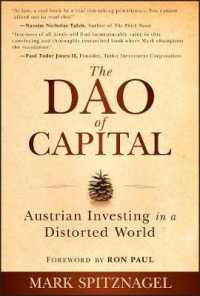- ホーム
- > 洋書
- > 英文書
- > Business / Economics
Full Description
First published in 1978, this book was written at a time when belief was high in Western-guided economic development of the emerging countries. The success of Marshall Plan in war-torn Europe generated a US-led optimism that, with generous inflows of aid and technical assistance, the Third World could be won over in the Cold War. The author's direct experience as a young academic economist in Cyprus, Malaysia, Uganda and Liberia led him to question this general optimism: the reality on the ground in the developing world did not seem to match Western optimism. Theories and blueprints, made in the West, did not fit the requirements of developing countries.
Higher production and better income distribution were inseparable twin objectives of developing nations. That meant, production of a higher national output must at the same time promote social justice. Investment must create adequate jobs so that new entrants into rapidly expanding labor force could be gainfully employed. Yet, the dominant (Western) theories of development at the time, in particular the Trickle Down Theory of Growth, prescribed "Growth First, Distribution Later" strategy. Similarly, Import Substitution Industrialization theories were emphasized at the expense of export-led growth. Dualistic Growth theories preached urban-biased, anti-rural development.
This book was written as a rebuttal of such faulty theorizing and misguided professional technical assistance and the book's message is no less valid today than in the 1970's.
Contents
Part I: Economic Growth Without Social Justice 1. What was Wrong with Post-war Planning in LDCs? 2. Distribution Effects of Growth: the Evidence 3. Absolute Poverty: Measurement and Identification 4. The Unemployment Problems of the LDCs Part II:Some Case Studies of the Influence of Elites on Economic Planning and Policy 5. Malaysia: From Colonial to Bumiputra Elitism 6. Liberia: The Americo-Liberian Elite 7. Revolution or Reform: The Experience of Pakistan, Brazil and Uganda Part III: Egalitarian Planning and Reform in LDCs 8. Towards More Egalitarian Development Planning 9. An Egalitarian Development Policy Based on Manpower Planning 10. Education Planning: Shifting from Elitist to Egalitarian Principles 11. Egalitarian Planning and Rural Development 12. Global Equity: Reforming the International Trade and Aid System 13. Summing up: Egalitarian Planning as a Non-violent Revolution








